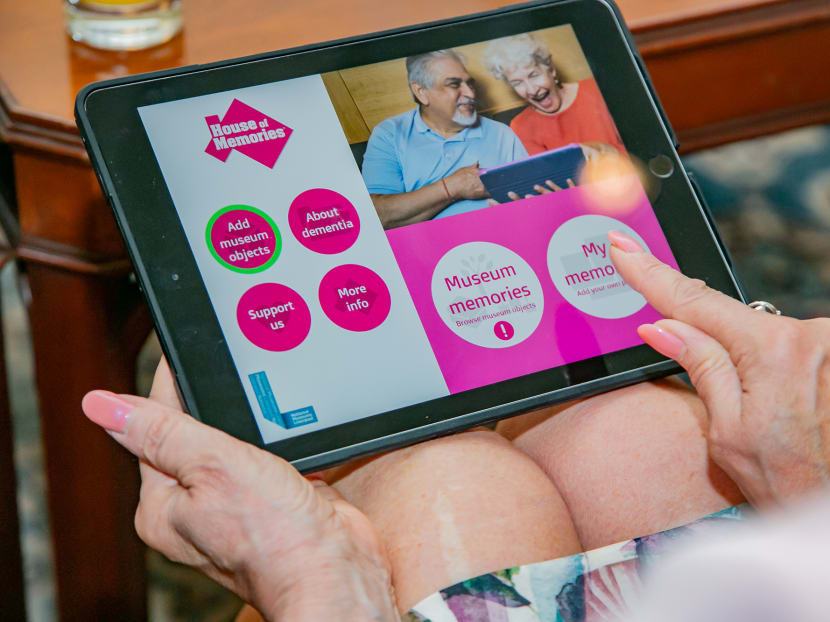Coming in 2020: Dementia-friendly app for seniors loaded with museum-provided content to jolt memories
SINGAPORE — When her dementia-stricken mother moved into a care facility in 2011, Ms Carol Rogers painstakingly pasted Post-it notes on photographs as reminders of important dates such as birthdays.

My House of Memories mobile application uses multimedia and multi-sensory approaches to stimulate conversation and interactions between people living with dementia and their caregivers.
SINGAPORE — When her dementia-stricken mother moved into a care facility in 2011, Ms Carol Rogers painstakingly pasted Post-it notes on photographs as reminders of important dates such as birthdays.
“I understood the power of objects, and the personal life history of my mum was enhanced and enabled by those interventions,” the director of engagement in the National Museums Liverpool of the United Kingdom said.
What Ms Rogers did for her mother has been broadened and adapted to become a digital tool and it is coming to Singapore.
On Monday (April 29), she signed a Memorandum of Understanding with the National Heritage Board (NHB) and the British Council Singapore to launch a mobile application called My House of Memories that was developed for dementia patients and their caregivers.
Ms Rogers launched it in the United Kingdom in 2014 and last year, the app was introduced in the United States.
This will be the first time the app will be made available in Asia.
It was developed by the National Museums Liverpool to provide tools and techniques from a museum-led dementia awareness training programme called House of Memories.
HOW THE APP WORKS
Working on the premise that objects can elicit deeply held memories, My House of Memories is a digital resource for museum artefacts that is designed to help jolt the memories of dementia-stricken patients and act as a personal archive.
The app has two modes: Museum Memories and My Memories.
The first, Museum Memories, features multimedia content such as images, videos and sound recordings.
“Museums can be fantastic resources to help unlock memories, improve communication and understanding, and enrich the lives of those living with dementia,” Ms Rogers said.
Like a memory trivia game, each object features a hint that directs the dementia patient to think about the memory associated with it and “stimulates conversations”, she added.
The second component, My Memories, allows users to take and upload individual photographs of significant objects in their everyday lives, creating a personal archive.
The app, available for both iOS and Android devices, has visual and hearing impairment options.
It has a senior-friendly interface including simple layouts and prominent icons to orientate users, as well as voiceovers for certain commands and icons that users press on screen.
THE SINGAPORE EDITION
In the UK, the app already has around 30,000 users.
Singapore’s edition of the app will feature about 100 objects from the national collection, which consists of around 250,000 artwork and artefacts. Some of the 250,000 pieces are on display in NHB’s museums and heritage institutions, while the others are housed in the Heritage Conservation Centre.
NHB’s chief executive officer Chang Hwee Nee said that these pieces could act as conversation starters “for reminiscence, sharing and bonding”.
NHB’s deputy chief executive of policy and community Alvin Tan said that in about a year, the app will be tested by the staff members and patients at Khoo Teck Puat Hospital to see if dementia patients could relate to the selected artwork and artefacts.
“We really want to test the objects to make sure they are really relevant and useful to the target audience,” Mr Tan added.
The app will be rolled out to the public in English by the end of 2020, while translations into Singapore’s other official languages will be made available at a later date.
The app development will be funded by NHB and the British Council in Singapore, whereas National Museums Liverpool will provide the knowledge and expertise, Mr Tan said.
Health and social care professionals, family, friends and care partners will be trained to understand how the app can be used to better support dementia patients.
More than 12,000 health and social care professionals and family carers have already accessed the House of Memories dementia awareness training programme across the UK and internationally.
NHB intends to introduce this project as part of its Silver Hubs Initiative launched last year at its three heritage institutions — the Sun Yat Sen Nanyang Memorial Hall, Malay Heritage Centre and Indian Heritage Centre. The Silver Hubs programmes include Reminiscence Walks, a guided heritage tour for seniors around Balestier, Kampong Glam and Little India, which aims to facilitate conversations based on the sights, smells and sounds experienced along these walks.






